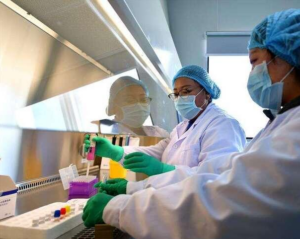
The new policy of medical insurance reimbursement will come out after the new crown “B class B management”, and the payment for serious patients is a concern.
The new coronavirus infection from the “category B A management” back to “category B B management”, the new coronavirus infected people also face new adjustments to the medical insurance policy.
Recently, in response to the new situation of epidemic prevention and control, many places have introduced temporary medical insurance reimbursement policies for outpatient, inpatient and drug reimbursement for new coronavirus infections. According to medical insurance insiders interviewed by this reporter, the new coronavirus will return to “Category B” from January 8, and the national level should introduce guiding documents for medical insurance reimbursement as soon as possible, among which, special attention should be paid to the medical expenses of seriously ill patients.
The general plan for the implementation of “Category B” management of new coronavirus infection proposes to implement graded treatment of new coronavirus infected patients and adjust medical insurance policies at the appropriate time. The reporter learned from informed sources that the National Health Insurance Bureau is developing guidance documents for adjusting medical insurance policies, and will be issued to localities in the near future.
Many places have introduced new policies for reimbursement of medical insurance for new crowns
After optimal epidemic prevention and control measures have been introduced one after another, the number of newly crowned infected people has increased greatly, and all designated medical institutions are allowed to receive newly managed infected people. In order to cope with such new situation, many local medical security departments have introduced temporary new crown medical insurance reimbursement policies.

File photo
The reporter found that the local policies introduced are mainly in three aspects: first, to develop outpatient reimbursement treatment for neo-crown, giving special concessions on the basis of general diseases, such as reducing or abolishing the starting line; second, to increase inpatient treatment and establish compensation mechanisms on top of the existing standards of medical insurance payment methods; third, to temporarily include a large number of neo-crown drugs into medical insurance.
In terms of outpatient treatment, on December 29 last year, Anhui Provincial Medical Security Bureau, the Department of Finance and the Health Care Commission jointly issued the “Urgent Notice on Outpatient Treatment of New Coronavirus Infection”, specifying that the medical expenses incurred by the insured for the treatment of new coronavirus infection in general outpatient (emergency) clinics in the co-ordinated area in accordance with the treatment plan for new coronavirus pneumonia and other regulations are included in the scope of payment of the basic medical insurance co-ordinated fund In the afternoon of December 31, 2022, the first outpatient reimbursement for NICs in Anhui Province was completed at the First People’s Hospital in Hefei.
For the settlement of outpatient expenses of NIC, the above notice pointed out that Anhui Medical Insurance Information Center optimized the settlement system module of the province’s medical insurance information platform and unified the medical category of “NIC (1102)” to settle outpatient expenses of NIC.
Shenyang Municipal Health Insurance Bureau of Liaoning Province temporarily included medical institutions with fever outpatient clinics (clinics) confirmed by the health care department at the second level or below as designated points for outpatient medical insurance coordination, and insured patients can sign up for outpatient coordination treatment when they have fever and are exempted from consultation fees.
The Medical Insurance Bureau of Chengdu City, Sichuan Province, promotes the inclusion of convenient fever treatment service stations in the full coverage of medical insurance outpatient network settlement, and includes fever consultation rooms (outpatient clinics) set up in qualified village health offices and other medical institutions in the management of medical insurance network settlement according to regulations, and the outpatient medical fees incurred during the period are not included in the management of urban and rural residents’ outpatient coordination and general consultation fees of designated medical institutions.
Jinchang City, Gansu Province will include the outpatient expenses of the newly coronavirus-infected insured residents attending outpatient clinics in first-class medical institutions into the scope of payment by the urban and rural residents’ basic medical insurance fund, which will be subsidized by the medical insurance fund at the rate of 100 yuan per visit (without taking up the annual general outpatient clinic coordination limit), and the reimbursement ratio will be 70% for the coordination fund and 30% for the individual.
In terms of hospitalization treatment, Jinchang City adjusted the outpatient and inpatient reimbursement policy for new coronavirus infection. between January 1 and March 31, 2023, the starting payment standard for inpatient hospitalization in primary medical institutions for people diagnosed with new coronavirus infection by designated medical institutions is 50 yuan.
In Shenyang, the starting hospitalization fee will be waived for patients whose main diagnosis is various types of pneumonia and other diagnoses containing new coronavirus infection and who are eligible for hospitalization, when they are hospitalized in designated medical institutions at level 2 or below. The city’s medical insurance administration department will settle the payment in accordance with the existing medical insurance payment methods and standards first, and the overspending will be compensated according to the overall standard of no less than the project payment.
Chengdu City included extra beds in hospital beds in the medical insurance reimbursement. Under the new stage of epidemic prevention and control, the occurrence of extra beds in inpatient beds in designated medical institutions that are overloaded with inpatients will be considered as normal bed services to be included in medical insurance reimbursement and will not be considered as a matter of assessment of the number of beds under agreement management.
In terms of drugs, several provinces have included a large number of new crown drugs in their medical insurance. Shaanxi Provincial Medical Security Bureau and three other units jointly issued a notice to temporarily include 107 kinds of Chinese patent medicines and 127 kinds of drugs of two categories that are highly targeted to the new crown condition and have more obvious therapeutic effects into the scope of medical insurance payment, medical insurance payment until June 30, 2023, to protect the medicine for confirmed and suspected patients.
Beijing temporarily included nematovir tablets/ritonavir tablets and 6 other drugs into the medical insurance. The Medical Security Bureau of Yunnan Province temporarily included 41 drugs, including “Sangju Yinqiao San” in the “Yunnan Province Drug Catalogue for People with New Coronavirus Infection (Trial Version 1)”, into the scope of medical insurance payment, and managed them according to Class A drugs to further meet people’s demand for medical treatment and reduce the cost burden of patients with new coronavirus infection.
In addition, Shandong and Guangdong also explicitly included the cost of Internet medical treatment into the scope of medical insurance payment.
Payments for patients with serious illnesses draw attention
A health insurance industry insider told reporters that the policies implemented around the country were not uniform during this transition period of the epidemic. Some regions have introduced special policies for new crown, some regions are still implementing the policy of zero individual co-payment for the past three years, and some regions have implemented the proportional payment for new crown according to general diseases.
The reporter called the Beijing Medical Insurance Hotline on the cost of new crown treatment, the staff said that Beijing is still implementing the policy of “zero out-of-pocket” for individual new crown treatment, and the cost of treatment for patients with confirmed or suspected new crown in the hospital will be borne by the medical insurance fund and the treasury, with no cost to the individual. This policy has not changed.
The Jinjiang Branch of Quanzhou City, Fujian Province, recently reminded the public that they are eligible for medical insurance if they are infected with the New Coronavirus. In terms of outpatient treatment, participants can enjoy general outpatient treatment if they seek medical treatment in primary medical institutions designated by the medical insurance. The reimbursement rate is 70% and the maximum payment limit is 420 RMB for visits to township health centers (community health service centers), and 50% and the maximum payment limit is 50 RMB for visits to the city’s designated village medical institutions (with a single reimbursement limit of 10 RMB).
A number of medical insurance industry insiders interviewed by this reporter believe that after the “B class B management”, the reimbursement policy of medical insurance will also gradually return to normal management, that is, the normal inclusion of medical insurance class B infectious disease payment management, the patient to seek medical treatment according to the medical insurance policy swipe card settlement.
A medical insurance researcher believes that after the implementation of the new crown category B management is to refer to the medical insurance payment rules for category B infectious diseases, there will be a part of the need to pay out of pocket, it is unlikely to be 100% reimbursement as in the special period.
Liao Zang Yi, associate professor at the School of Politics and Public Administration of China University of Political Science and Law, told reporters that the reimbursement policy of medical insurance will also gradually return to normal management, but the payment of costs for seriously ill patients still needs to be given high priority.
The white paper “China’s Action to Combat the New Coronary Pneumonia Epidemic” released in June 2020 had pointed out that the per capita medical cost for confirmed patients with new coronary is about 23,000 yuan. Among them, the per capita treatment cost for seriously ill patients exceeds 150,000 yuan, and some critically ill patients have treatment costs of hundreds of thousands or even millions of yuan.
According to the reimbursement policy in the past three years, these critical illness costs are completely borne by the state. Liao Zangyi said that the next adjustment of medical insurance policy should focus on the cost of critically ill patients. China should establish multiple protection methods, including normal reimbursement and temporary relief, to reduce the medical burden of seriously ill patients.
Jinjiang City stipulates that if the original underlying disease is aggravated due to infection with the new coronavirus, those who meet the reimbursement scope of Jinjiang City’s mega disease can also apply to Jinjiang City’s medical insurance agency for mega disease subsidies after reimbursement by basic medical insurance and major medical insurance, and the out-of-pocket expenses within the policy can enjoy 35% to 70% subsidies according to different diseases. If you have sequelae due to the new crown virus infection, you can apply for “outpatient rehabilitation treatment for patients discharged from the hospital with new crown pneumonia” as a special outpatient disease if the designated medical institutions meet the conditions, and the related expenses will be reimbursed according to the regulations.
“For seriously ill patients, a trigger mechanism should be established, the treatment of seriously ill patients and ICU and other personal out-of-pocket expenses to a certain amount, medical insurance should intervene, ‘Class B B control’ after the medical insurance reimbursement policy should also have flexibility and the principle of temporary relief. ” Liao Zang Yi said.


Average Rating